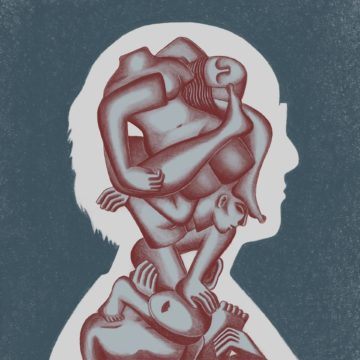Merve Emre in The New Yorker:
 The “Torso of Adèle” is among the smallest and most sensual of Auguste Rodin’s partial figures. She has neither head nor legs; her body reclines with its elbows raised and one arm flung across her neck, her back arching into the air. The eye seeks the point that balances her movement. Skimming her breasts, her ribs, her navel, it comes to rest on her iliac crest, the bone that wings its way across the hip. “From there, from Ilion, from her crest, Odysseus departed on his return to Ithaca after the war,” thinks the narrator of “The Iliac Crest” (2002), the second novel by the Mexican-born writer Cristina Rivera Garza. To his wandering mind, “Iliac” summons Ilion, Homer’s Troy—a city destroyed because one selfish man desired one beautiful woman. In Rivera Garza’s fiction, quests for desirable bodies do not destroy cities. They destroy the identities—man, woman—worshipped by rulers.
The “Torso of Adèle” is among the smallest and most sensual of Auguste Rodin’s partial figures. She has neither head nor legs; her body reclines with its elbows raised and one arm flung across her neck, her back arching into the air. The eye seeks the point that balances her movement. Skimming her breasts, her ribs, her navel, it comes to rest on her iliac crest, the bone that wings its way across the hip. “From there, from Ilion, from her crest, Odysseus departed on his return to Ithaca after the war,” thinks the narrator of “The Iliac Crest” (2002), the second novel by the Mexican-born writer Cristina Rivera Garza. To his wandering mind, “Iliac” summons Ilion, Homer’s Troy—a city destroyed because one selfish man desired one beautiful woman. In Rivera Garza’s fiction, quests for desirable bodies do not destroy cities. They destroy the identities—man, woman—worshipped by rulers.
No one clings to his manhood more ardently than the narrator of “The Iliac Crest,” a physician at a state-run sanatorium. He lives alone in a forbidding house, on a wild spit of land somewhere near the ocean, on the border of two nations. One storm-thrashed night, a woman arrives at his door, trembling and disconcertingly lovely. “What really captured my attention was her right hip bone, which, because of the way she was leaning against the doorframe and the weight of the water over her skirt’s faded flowers, could be glimpsed just below the unfinished hem of her T-shirt and just above the elastic of her waistband,” he observes. His clinical gaze is clouded by the allure of his visitor’s body. The learned language of anatomy eludes him: “It took me a long time to remember the specific name for that bone, but, without a doubt, the search began at that moment. I wanted her.”
